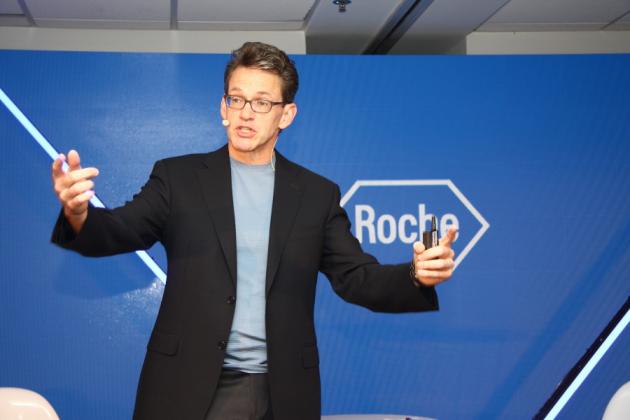CHICAGO, Ill. -- Roche Pharmaceuticals is one of is the largest healthcare investors in the world, with an investment of $11 billion in research and development this year. The R&D spending includes medicine, diagnostic, and areas that are in the cutting edge between medicine and diagnostics, such as real-world data (RWD) and molecular information.
Regarding its oncology portfolio, the company has 16 medicines, the broadest portfolio for cancer medicine in the world. Roche also has 72 clinical trials going on in cancer immunotherapy, while 64 of the 72 are trials for combination therapies.

However, the company still plans to continue to expand its pipeline. This year, the company plans to launch two more cancer medicines and five to eight more in the next five year.
“We launch new products while paying attention to speed because speed matters to cancer patients as they don’t need a solution next year they need something now,” Roche Pharmaceuticals CEO Bill Anderson said during a media meeting ahead of ASCO 2019, on Friday. “We are very proud to have 15 U.S. FDA breakthrough designations and two EMA prime designation which is all part of making the drugs available for patients as fast as possible.”
In the longer term, the company is pioneering several forms in treatment, Anderson added.
“Roche was an early pioneer for monoclonal antibodies such as Herceptin,” Anderson said. “But now in addition to monoclonal antibodies and small molecules, the company plans to bring in a number of other types of molecules and treatments such as bi-specific antibodies, fusion protein, antibody-drug conjugates (ADC) and vaccines.”
Regarding bi-specifics antibodies, these are antibodies that attach itself to two different proteins or cell instead of one and engage and activate T Cells to kill tumor cells, he added.
Ander went on to say, “Fusion Protein is another approach we have with an immune molecule called an interleukin 2 (IL2) where we’re taking the effect of IL2 and enhancing it to amplify the immune response.”
For the company’s work in ADC, Roche is conducting researches for polatuzumab vedotin, which treats relapsed diffuse large B-Cell lymphoma (DLBCL). The treatment targets a protein on a tumor cell, bringing a toxic which is very potent along to kill the tumor cell.
For vaccines, the company studies the patient’s tumor and look for mutations the tumor might have. Afterward, the company runs an algorithm that predicts what will trigger an immune response based on the mutations and the patient’s tumor and insert a synthetic RNA into the patient which raves up the patient’s immune system to attack cancer, according to the Roche CEO.
“However Roche is not only focused on bring new in treatments but to personalize healthcare,” Anderson said. “At the end of the day, our business is about getting the right drug to the right patient and unfortunately in cancer care historically so often patients are getting drugs that have a lot of side effects, but they don’t kill cancer.”
The company envisions a world where every patient is getting just the right drug for their tumor, and every patient is getting a response to their treatment, he added.
However, for the company to achieve its goal, it first needs to obtain many data as it needs to know for sure which kind of patients and tumors are responding to which type of drugs, Anderson noted.
“Such data includes clinical trial data but also RWD,” he said. “It also includes analytics that goes behind the data such as artificial intelligence that can predict what kind of treatment we can provide to the next patient.”
Roche will use the data for two ultimate goals -- obtaining new insights for R&D and providing the next patient who develops cancer and needs the best treatment that fits them.
“Such progress is already happening today,” Anderson said. “An example would be Flatiron Health, a subsidiary of Roche, which is capturing RWD on more than 2 million patients across the U.S. and is now expanding outside of the U.S.”
The company also works closely with Foundation Medicine, another subsidiary of the company, which is doing next-generation sequencing, he added.
Foundation Medicine looks at more than 400 genes for each tumor and patients to say which genes might have been mutated and what are likely therapies that can benefit the patient.
“The real world evidence (RWE) obtained from the two companies will help advance research and discovery in oncology and potentially inform clinical guidelines,” he said. “It will also help Roche in predicting which patient will benefit from what drug and bring about a world where every patient benefits and no patient is getting a drug that only brings them side effects and not a solution for their tumor.”

